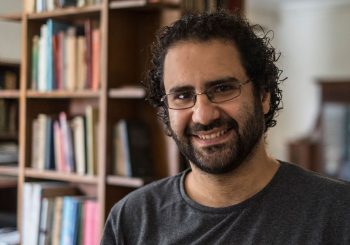Egyptian President Abdel-Fattah Al-Sisi directed the country’s Public Prosecution to investigate the circumstances surrounding the death of late footballer, Ahmed Refaat, a presidential press release announced.
The investigation aims to identify any potential misconduct related to Refaat’s travel arrangements and military service — an issue that Refaat cited as a cause for his mental and physical health struggles shortly before his death.
The press release announced that the case will be scrutinized to ensure that all legal processes are followed and that any breaches of law are addressed. This initiative is intended to hold accountable anyone found responsible for violations in the handling of Refaat’s affairs.
THE HISTORY LEADING UP TO REFAAT’S TRAGIC DEATH
Days before his death, Refaat went on live television with football talk show host Ibrahim Fayek to discuss his ongoing recovery, having suffered from a cardiac arrest during a match in March 2024.
While Refaat intended to update and assure fans of his recovery process, the interview also revealed signs of misconduct in the player’s affairs by authoritative figures — resulting in mental and physical stress.
“What happened to me and what I had to go through isn’t normal for a football player, or a normal person for that matter,” he explained to Fayek.
Refaat, who played for Modern Sport Club (formerly Modern Future FC), never directly revealed the cause for his stress. However, he hinted that it entailed a loan to Emirati club Al-Wahda while he had yet to fulfill his domestic military duties.
Several figures linked to Refaat and his incident were put into question by media figures and social media users. This includes his agent, Nader Shawky, the president of the Egyptian Premier League and former owner of Modern Sport Club, Ahmed Diab.
After his death, Shawky also went live with Fayek to address the controversy, spending the entire hour of the show explaining the entire situation.
Refaat’s brother also joined in on a call during the episode, calling out Diab to explain the “psychological damage” he caused to the footballer. He also called on Diab to call the host to explain his case, who did so midway through the episode.
A tense exchange ensued between Shawky and Diab, with the former accusing the latter of failing on his promise to Refaat to obtain the necessary travel permits to loan him to Al-Wahda.
Diab refuted this by clarifying that he had previously obtained permits for Refaat to travel to Liberia, as part of the squad for a match in the African Confederations Cup, and then to Abu Dhabi to complete his loan move to Al-Wahda.
Soon after arriving at the club, the player began receiving phone calls from Egyptian authorities, telling him he was now considered a fugitive — asserting that he had not been granted permission considering his lack of mandatory conscription in the army — demanding he return promptly.
The situation created strain between the player, Al-Wahda, and Modern Sport Club. His contract was terminated nearly three months into his loan, consequently invalidating his residence permit and pushing him to return to Egypt.
His return resulted in a two-month imprisonment at a military site where he was permitted to train with Tala’a El-Geish, an army-owned football club.
“He felt injustice, a lack of fairness; he felt he was tricked,” Shawky said later in the interview.
Diab affirms that even after selling the club, he conducted multiple face-to-face meetings with senior military personnel to solve the issue but to no avail.
A third figure, spokesman for the Ministry of Youth and Sports, Mohamed El-Shazly, later joined the interview through a phone call as well. Shazly clarified that while that players require permits from the ministry to travel, he also asserted that this is only the first step of the process.
Shazly explained that the military grants the final decision — a step that Diab allegedly did not complete for the players despite reassuring him that all papers are in order.
Sixteen days after his interview with Fayek, on 6 July, Ahmed Refaat died in his home due to a second cardiac arrest. His passing sent shockwaves across the football community and continues to spark controversy to this day.
Looking to prevent any future issues for players with a similar case to Refaat’s, President Al-Sisi has mandated that relevant authorities streamline and clarify the protocols for permitting athletes to travel abroad during their military service.







Comments (0)